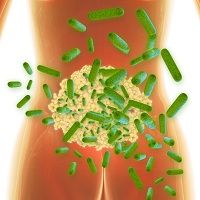Article
Fecal Transplantation Potentially a Treatment for Ulcerative Colitis
Author(s):
As fecal microbiota transplantation (FMT) has gained acceptance and popularity as a treatment for c. difficile infection, researchers have also been investigating the benefits of the procedure for treating other disorders of the gut, including ulcerative colitis (UC).

As fecal microbiota transplantation (FMT) has gained acceptance and popularity as a treatment for c. difficile infection, researchers have also been investigating the benefits of the procedure for treating other disorders of the gut, including ulcerative colitis (UC).
One study led by Elena Verdu, associate professor of medicine, Michael G. DeGroote School of Medicine, recently published in Inflammatory Bowel Diseases revealed that specific bacteria living in the gut could control UC. Verdu said, “Our animal research provides insight that selected bacterial groups, involved in gut health, are important for protecting the colon against injury and inflammation.”
Verdu’s study looked at mice that were administered gut bacteria from patients afflicted with severe UC compared with mice that were given bacteria from healthy individuals.
The study results initially classified a decreased number of bacterial families integral for gut health. Findings also highlighted higher levels of inflammation in the mice with UC bacteria than in the placebo group.
On the implications of the study, Verdu commented, “The study also showed that the same protective effect could be achieved using the fecal material from the healthy person as with the specific groups of bacteria that were isolated from the ‘healthy’ fecal matter.”
Additionally, in another research study published in Gastroenterology Paul Moayyedi, MD, analyzed the safety and efficacy of FMT in a total of 75 patients. This group was randomized to either receive FMT as an enema from anonymously donated stools or placebo of water enemas.
“FMT induced remission in a significantly greater percentage of patients with active UC than placebo,” said Moayyedi.
Moayyedi continued, “The effect of fecal transplant seems to be dependent on the sort of bacteria that is in the donor stool, which fits with the observations of Dr. Verdu’s animal study.”
Both authors remarked, “Many questions remain, but this provides interested data suggesting that altering the microbial flora may be promising for treating ulcerative colitis.”




